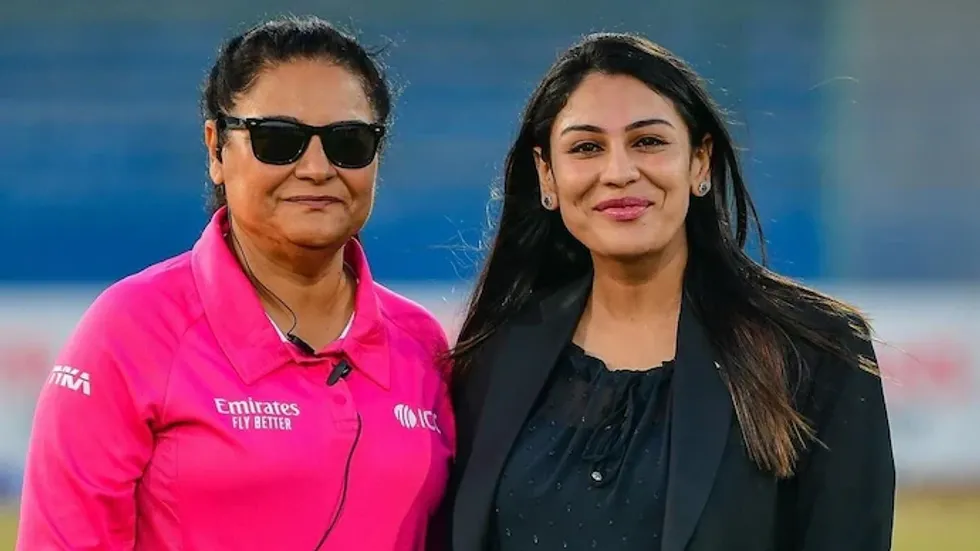Umpiring her way to history: Saleema Imtiaz's inspiring story
Imtiaz is the first Pakistani woman umpire on the International Cricket Council's Development Panel.

Kulsoom Jahan
Sports Correspondent
Kulsoom Jahan is a driven and accomplished professional with a passion for sports, news, storytelling, and in-depth fact-gathering. With eight years of experience in the sports media industry, she has honed her skills in conducting insightful interviews, crafting compelling narratives, and delivering high-quality content. Known for her ability to meet deadlines well in advance, Kulsoom is meticulous in her attention to both video and audio details, ensuring excellence in every project she undertakes. Her dedication and expertise make her a valuable asset in the ever-evolving world of sports media.

Saleema Imtiaz during an interview with Nukta at the National Stadium in Karachi.
Nukta
Married women often face societal pressure to prioritize domestic duties over professional aspirations in Pakistan. However, trailblazers like Saleema Imtiaz are challenging this norm.
As Pakistan's first woman umpire on the International Cricket Council’s (ICC) Development Panel, Saleema has defied convention by launching her career after marriage and achieving remarkable success.
The 52-year-old marked a major milestone in Pakistan cricket after becoming the first woman to be nominated to the ICC’s International Panel of Development Umpires earlier in September.
Major milestone
The prestigious nomination qualified Imtiaz to officiate in women’s bilateral international matches and ICC Women’s Events, paving the way for future generations of women interested in the field.
Soon after, Saleema saw her first on-field appointment by officiating in the three-match Twenty20 International (T20I) series between Pakistan and South Africa held in Multan the same month.
“I've reached a significant milestone, being nominated to the ICC Panel of Development Umpires,” Saleema told Nukta. “However, my ultimate goal remains to officiate in ICC events. My focus is unwavering, every time I step onto the field, I strive for excellence, thoroughly prepared to make my country and nation proud,” she added while sharing her long-term goals in the field.
Challenges faced
In 2006, many years after her marriage, Imtiaz completed a two-year umpiring course from the Pakistan Cricket Board (PCB) and embarked on her umpiring career.
“It was incredibly tough,” she said. “It is challenging for women to establish a career after marriage. Juggling family responsibilities with my passion for umpiring seemed impossible at times.”
The Karachi-born, who had also played cricket in 2005 and participated in numerous tournaments and the National Championships, shared that initially she faced skepticism during umpiring in the men's game.
“When boys see a female umpire, they often wonder if she is up to the task but I have proven myself, earning their respect through my expertise and professionalism,” she said.
Mother-daughter duo
Saleema is mother to the renowned Pakistani cricketer Kainat Imtiaz, who has represented the country in 40 international matches.
Having officiated in the 2022 Women’s Asia Cup and the 2023 ACC Emerging Women's Cup in Hong Kong, Saleema said that the former held special significance to her as both the mother-daughter featured in it.

“I couldn’t become an international cricketer for Pakistan, but Allah had other plans,” she said. “My daughter achieved what I couldn’t, and sharing the field with her was a dream come true.”
Strong support system
With young children to care for and a household to manage, Imtiaz credited her husband's unwavering support as the driving force behind her success.
Saleema emphasized on the importance of family’s support and how it motivates her to do better. “My husband is the one who encouraged me to pursue umpiring,” she said.
“Without his support, I wouldn't be where I am today. In fact, my family's enthusiasm only grew when my daughter Kainat and I began representing Pakistan together. My father and brothers take immense pride in our achievements, which motivates me to continue pushing boundaries.”
Breaking into the male-dominated sports arena was a daunting challenge, but Saleema was blessed with a strong support system.
“In a society where men often hold sway, I'm grateful for the encouragement I received. My teachers, colleagues, and mentors guided me, correcting my mistakes and fostering growth.”
Countering human error
Saleema highlighted the crucial need for umpires to stay abreast of evolving cricket laws and regulations, ensuring accuracy and consistency in their decision-making. “Whenever rules and regulations change, the PCB ensures we stay up-to-date through refresher courses, covering new regulations announced by the ICC or communicated via PCB emails,” she said.
The Karachi-based official emphasized that while third umpire reviews enhance accuracy, they're not foolproof. “If the decision goes to the third umpire and they confirm the out call, it is generally considered correct,” Saleema explained. “However, even with technology, human error can still occur due to limitations of the human eye.”
Saleema highlighted that the lack of grassroots infrastructure is a major obstacle hindering women's cricket development in Pakistan. “Cricket has become a global phenomenon, taught from a young age worldwide,” she said, urging the need for a conducive environment where girls get equal chances to develop their cricketing skills.
“In Pakistan, boys have access to training and academies, while girls are left without opportunities or support.”







Comments
See what people are discussing